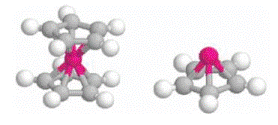Department of Physics and Astronomy: Publications and Other Research

Peter Dowben Publications
Document Type
Article
Date of this Version
1-1-2020
Citation
Paulo S Costa et al 2020 J. Phys.: Condens. Matter 32 034001
Abstract
The addition of various dipolar molecules is shown to affect the temperature dependence of the spin state occupancy of the much studied spin crossover Fe(II) complex, [Fe{H2B(pz)2}2(bipy)] (pz = pyrazol-1-yl, bipy = 2,2′-bipyridine). Specifically, the addition of benzimidazole results in a re-entrant spin crossover transition, i.e. the spin state starts in the mostly low spin state, then high spin state occupancy increases, and finally the high spin state occupancy decreases with increasing temperature. This behavior contrasts with that observed when the highly polar p -benzoquinonemonoimine zwitterion C6H2(..NH2)2(..O)2 was mixed with [Fe{H2B(pz)2}2(bipy)], which resulted in locking [Fe{H2B(pz)2}2(bipy)] largely into a low spin state while addition of the ethyl derivative C6H2(..NHC2H5)2(..O)2 did not appear to perturb the spin crossover transition of [Fe{H2B(pz)2}2(bipy)].
Included in
Atomic, Molecular and Optical Physics Commons, Condensed Matter Physics Commons, Engineering Physics Commons, Other Physics Commons


Comments
Copyright ©2019 IOP Publishing. Used by permission.
CC BY-NC-ND